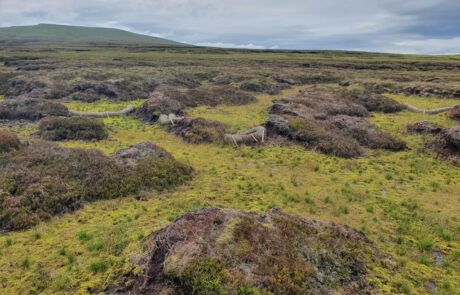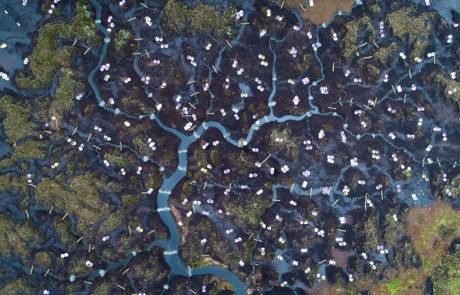News
Major investment in UK peatlands from German environmental association
€1.1 million investment to rewet some of the UK’s most valuable peatlands
A significant international collaboration to support peatland restoration in the North Pennines National Landscape has been announced by German environmental association, the Nature And Biodiversity Conservation Union (NABU).
The €1.1 million investment will be used to restore valuable peatlands in the North Pennines, helping to promote better global climate regulation. Healthy peatlands are vital for biodiversity and provide multiple benefits for society, such as flood mitigation, improving water quality, and storing carbon.
The funding will support work on over 900 hectares of degraded peatland on five key North Pennines sites in Cumbria and County Durham. Restoring this land area, equivalent to over 1200 football pitches, will improve habitat quality and restore water levels of the blanket bog. All the land is in private ownership, and the project is being carried out in collaboration with landowners and land managers.
Paul Leadbitter, Peatland Programme Manager with the North Pennines National Landscape team, said: “We’re really pleased to be working with NABU, and to be delivering this project that meets their ambition to address the climate and biodiversity crises.
“This is a significant and very welcome investment and is the first funding we have had from a non-UK partner since our EU LIFE programme that began in 2017. The North Pennines National Landscape team is leading the way in attracting green finance for such large-scale environmental projects.”
NABU is the oldest and largest environment association in Germany, with more than 940,000 members and supporters, who commit themselves to the conservation of threatened habitats, flora, and fauna, climate protection and energy policy.
Frank Woesthoff, who leads NABU’s climate fund, said: “Nature knows no borders and at NABU we work tirelessly to protect species, habitats, and climate, at home and abroad. We are committed to projects around the globe, empowering strong local partners to take action for nature conservation, and against the climate and biodiversity crises.
“Peatlands are a priority for NABU and we are very pleased to be putting this funding in place to directly improve these valuable habitats in order to bring them back to their natural state.”
The collaboration with NABU began after the North Pennines National Landscape team presented at a United Nations Environment Programme (UNEP) partner webinar on green finance.
The NABU investment contributes to the North Pennines National Landscape team’s work as part of the Great North Bog coalition, an ambitious, large-scale peatland restoration initiative being developed by the North Pennines National Landscape team, the Yorkshire Peat Partnership, the Moors for the Future Partnership, the Northumberland Peat Partnership, Cumbria Peat Partnership, and Lancashire Peat Partnership. The Great North Bog coalition partnerships are led by National Park Authorites, National Landscapes teams, and Wildlife Trusts, collaborating with local partners to bring large-scale benefits for people and nature.
NABU Federal Managing Director, Leif Miller, said: “With the NABU climate fund, we are pursuing the goal of saving peatlands on a much larger scale than before. This is because peatlands are the most effective, but also the most damaged, natural carbon reservoir. Unfortunately, we have only been able to use some of the funds we raise from industry in Germany so far. We are therefore particularly pleased to be working with the North Pennines National Landscape team, which has years of experience in the rapid implementation of large-area programmes.”
The Great North Bog is a landscape-scale approach to upland peatland restoration and conservation across nearly 7000 square kilometres of peatland soils in the Protected Landscapes of northern England, storing 400 million tonnes of carbon. The programme aims to develop a working partnership to deliver a 10-year funding, restoration, and conservation plan to make a significant contribution to the UK’s climate and carbon sequestration targets.
ENDS
Notes to Editors:
For further information, contact the North Pennines National Landscape communications team – communications@northpennines.org.uk / phone: 01388 528801 / 07920020648, or email NABU’s press contacts – Roland Panter or Silvia Teich – presse@nabu.de
Images, all © North Pennines National Landscape, of a damaged peatland site in the North Pennines before, and three years after, restoration, and also images showing peatland restoration in progress in the North Pennines are attached. For alternative images, please contact the communications team on communications@northpennines.org.uk
The North Pennines National Landscape is one of England’s most special places – a peaceful, unspoilt landscape with a rich history and vibrant natural beauty. It was designated as an Area of Outstanding Natural Beauty (AONB) in 1988. The purpose of this nationally recognised designation is the conservation and enhancement of the natural beauty of the area.
At almost 2,000 sq. kilometres the North Pennines is the second largest of the 46 National Landscapes (in England, Wales and Northern Ireland) and is one of the most peaceful and unspoilt places in England. Visit www.landscapesforlife.org.uk for information about the National Landscapes family.
The North Pennines lies between the National Parks of the Lake District, the Yorkshire Dales, and Northumberland with the urban centres of County Durham away to the east. Parts of the National Landscape are within the boundaries of four local authorities; Cumberland Council, Durham County Council, Northumberland County Council, and Westmorland & Furness Council.
The North Pennines National Landscape Partnership is an alliance of public, statutory and voluntary sector bodies with an interest in the future of the North Pennines. The work of the partnership is carried out by the National Landscape team which takes action to conserve and enhance the natural beauty of the area, to raise awareness of its special qualities and to improve the quality of life for local people.
UNESCO Global Geopark – As well as being a National Landscape, the North Pennines is a UNESCO Global Geopark. This puts the area’s Geopark status in the same UNESCO family as World Heritage Sites and Biosphere Reserves. UNESCO Global Geoparks are places with outstanding geology where special effort is made to make the most of geological heritage to support community and economy. Locally this includes producing geo-trails, developing projects with school and community groups, producing displays for visitor attractions and holding geology festivals and events.











